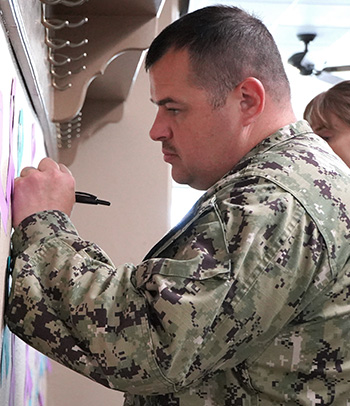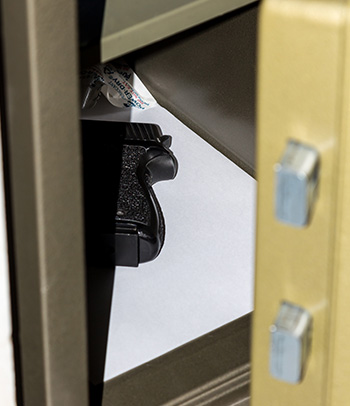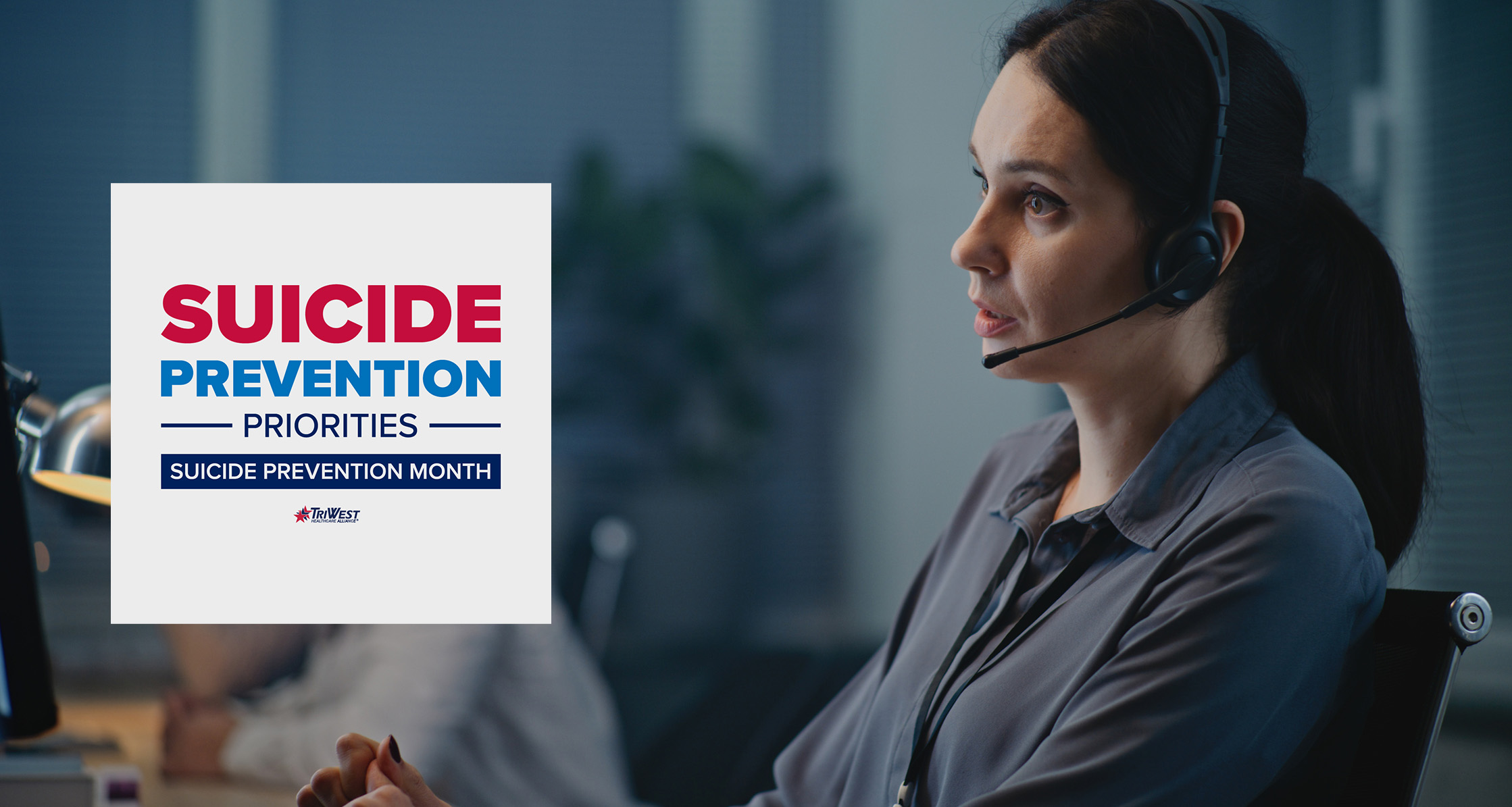The most immediate, trusted and effective resource for those in crisis in military-connected and Veteran communities is VA’s Veterans Crisis Line. Veterans, Service members, Reserve members, and those who support them can dial 988, then press 1, to connect with qualified professionals trained to help.
In our nation’s military and Veteran communities, suicide remains a serious and prevalent issue that is often a topic that can be difficult to discuss or fully understand.
The occurrence of suicide in military and Veteran communities is especially troubling as these valued citizens have served, contributed, and sacrificed for our nation’s defense.
September is National Suicide Prevention Month and it’s important for each of us to increase our awareness and prioritize personal connection, provide support, and emphasize hope for military-connected individuals facing severe personal crisis.
As a long-time supporter of military and Veteran communities, TriWest Healthcare Alliance (TriWest) is humbled to support the Department of Defense (DOD) and the Department of Veterans Affairs (VA) in their shared priorities to prevent suicide.
This year, TriWest has spotlighted a month-long, online suicide awareness campaign in support of DOD’s and VA’s priorities – “Committed to the Fight: Suicide Prevention.”
TriWest is committed to helping military-connected individuals and our workforce who may be in crisis – or know someone who might be – by sharing important information and resources to address and prevent suicide. Together, we can gain knowledge and stay in the battle.
Suicide Realities in Our Nation’s Veteran and Military-Connected Communities
 According to the most recent annual statistics in VA’s 2024 National Veteran Suicide Prevention Annual Report, there were 6,407 Veteran suicides in 2022. The report also revealed suicide is the second-leading cause of death for Veterans under age 45.
According to the most recent annual statistics in VA’s 2024 National Veteran Suicide Prevention Annual Report, there were 6,407 Veteran suicides in 2022. The report also revealed suicide is the second-leading cause of death for Veterans under age 45.
Likewise, suicide remains a serious concern at DOD where the active duty suicide rate has been increasing for several years.
The most recent available statistics in DOD’s Annual Report on Suicide (ARSM) in the Military: Calendar Year (CY) 2023 revealed that suicides per 100,000 Service members was 9 percent higher than in 2022.
Active duty suicide rates have gradually increased since 2011, with most losses being young, enlisted men. Military family members, including spouses and dependents have also lost their lives to suicide.
Each military-connected and Veteran suicide has far-reaching impacts, touching family members, friends, and colleagues, and can leave emotional wounds that will never fully heal.
That’s why it is especially important that everyone in our military and Veteran communities increase their awareness, personal engagement, and access resources DOD and VA prioritize to prevent suicide.
Prioritizing Connection, Engagement, and Immediate Support to Prevent Suicide
 Across our military and Veteran communities, both VA and DOD emphasize and share similar top priorities to help prevent suicide. Both departments promote similar effective approaches, available resources, and actions we can all embrace to proactively recognize, engage, and provide support to reduce suicide in these communities.
Across our military and Veteran communities, both VA and DOD emphasize and share similar top priorities to help prevent suicide. Both departments promote similar effective approaches, available resources, and actions we can all embrace to proactively recognize, engage, and provide support to reduce suicide in these communities.
Embracing effective suicide prevention approaches and resources enables anyone to increase their awareness, identify personal crisis signs, and immediately act to prevent a suicidal crisis.
Shared DOD and VA priorities for suicide prevention emphasize the importance of military and Veteran communities raising their awareness of crisis signs, showing genuine concern, and engaging with those in crisis by providing immediate support and resources that can be lifesaving.
One top suicide prevention priority for military and Veteran communities is VA’s S.A.V.E. training, which offers practical steps for military-connected individuals to recognize and address suicidal crisis.
The free, short, online training provides education on crisis signs, how to engage in direct conversations, quickly identify support needs, and effectively connect those in crisis with immediate support and resources.
S.A.V.E. training spotlights these essential steps to remember in suicide prevention:
- Signs of suicide
- Asking about suicide
- Validating feelings
- Encouraging help and expediting treatment.
S.A.V.E. training also emphasizes that it doesn’t take an expert to engage with someone facing personal or suicidal crisis. Expressing genuine care, concern, and connecting them to resources can be done by anyone.
DOD and VA emphasize in their suicide prevention priorities that in personal crisis, compassion, concern, and connection with immediate, trusted resources are essential.
The most immediate, trusted and effective resource for those in crisis in military-connected and Veteran communities is VA’s Veterans Crisis Line. Veterans, Service members, Reserve members, and those who support them can dial 988, then press 1, to connect with qualified professionals trained to help.
The Veterans Crisis Line offers free, confidential support, 24/7 – by phone, chat or text from trained responders, often Veterans who understand their callers. The crisis line responders, trained in intervention and who are often Veterans, provide immediate connection and resources, or refer other services for each situation.
Immediate connection and concern can provide hope in a crisis, and at the right moment, even a small amount of connection, concern, and support can prevent suicide.
Emphasizing Lethal Means Safety, Awareness, and Secure Firearms Storage
 Another shared suicide prevention priority for both DOD and VA includes lethal means safety training and practices across all military and Veteran communities.
Another shared suicide prevention priority for both DOD and VA includes lethal means safety training and practices across all military and Veteran communities.
The most common lethal means involve firearms, medication, or alcohol, and mental health experts instruct access to these means can impact suicide attempts.
Lethal means safety interventions make it more difficult for an individual in crisis to access a lethal object or situation, hopefully reducing suicide attempts and deaths.
If a suicidal person is unable to immediately access the means they planned to use, they generally do not quickly move to other means during a crisis, VA emphasizes.
The Veterans Self-Check Assessment is a free, confidential, 10-minute quiz VA designed for Veterans, active duty members, National Guard and Reservists, and family members to find out if their stress and depression may bring crisis – and what recommended actions to take.
VA’s Keep it Secure program promotes firearm storage awareness and provides effective steps to securely store firearms and ammunition. The program emphasizes comprehensive and simple lethal means safety steps to help protect military-connected and Veteran individuals.
Lethal means such as firearms, medicines, alcohol, substances, ropes, cords and sharp objects can increase suicide risk, VA emphasizes. Placing time and distance between a person in crisis and access to lethal means can reduce suicide risk and save lives.
Building and Sustaining Prevention Efforts to Foster a Supportive Environment
 Surveys of Veterans from different service eras have shown that military-connected individuals and Veterans are more likely to accept support from sources they trust.
Surveys of Veterans from different service eras have shown that military-connected individuals and Veterans are more likely to accept support from sources they trust.
Both DOD and VA emphasize in their suicide prevention priorities that these trusted sources of support are fellow military members, Veterans, military-connected relatives and friends, and local community groups.
Fostering and offering a trusted, supportive environment to prevent suicide doesn’t require academic degrees, certifications, or experience in mental health care, VA states.
A trusted, supportive environment includes being the first to recognize when something is wrong, understanding our part to have compassionate conversations and offer help, and emphasizing hope to prevent a crisis before it starts, VA says.
VA’s Crisis Conversation Handout emphasizes anyone can start a trusted, compassionate conversation if someone exhibits behaviors, including:
- Appearing sad or depressed most of the time.
- Feeling as if there is no reason to live.
- Feeling excessive guilt, shame, or sense of failure.
- Rage or anger.
- Increasing alcohol or drug misuse.
- Withdrawing from family and friends.
Simply having compassionate and attentive conversations as a supportive, trusted source can make a difference in preventing suicide during a crisis:
- Make supportive and encouraging comments, don’t ask invasive questions.
- Don’t inject judgment or emotion into the conversation. Stay calm.
- Listen more than speaking – avoid dominating the conversation.
- Be a compassionate, attentive listener to offer support in a suicidal crisis.
These tips and other resources are critical to sustaining a supportive environment to address suicide crisis without creating stigma or isolation.
Suicide can be prevented. Embracing the priorities and approaches both DOD and VA share empowers everyone in our military and Veteran communities to prevent suicide.







